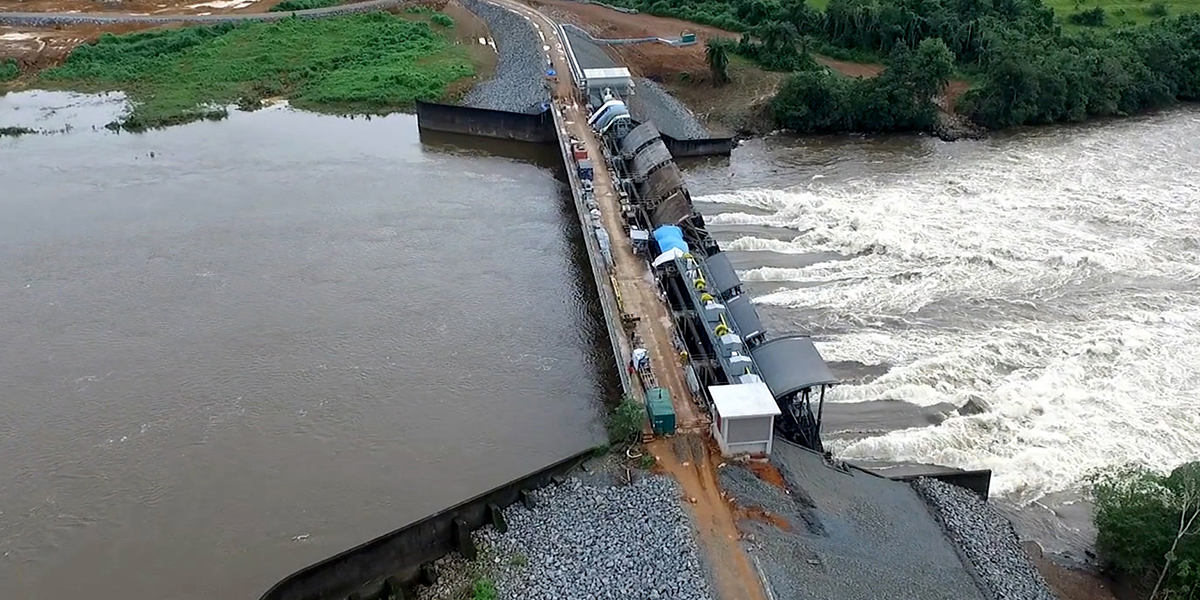Program Overview
MCC’s $257 million Liberia Compact (2016–2021) aims to encourage economic growth and reduce poverty by improving access to reliable and affordable electricity. The Compact funded the $202 million Energy Project to generate low-cost power by rehabilitating the Mount Coffee Hydropower Plant (MCHPP), to build capacity in the utility company, and to establish an independent regulator. The project aims to increase production and distribution of lower cost, quality electricity, reduce tariffs and user costs, and connect Liberians to affordable electric power.
Key Findings
Mount Coffee Hydropower Plant Rehabilitation
- MCC, along with other donors, increased production from 0 to 88 megawatts for Liberia’s largest electricity asset. While MCHPP was successfully rehabilitated, ongoing operations and maintenance is underfunded, increasing the risk of turbine or plant failure, additional rehabilitation costs, and potential emergency situations.
Utility, Regulatory, and Grid-Level Outcomes
- The Liberia Electricity Corporation (LEC) has been in a grave financial situation for the last decade. The MCC-funded management services contract (MSC) assumed responsibility in 2018. While the MSC has made some progress, LEC requires funding for operations and capital expenses, and a systematic response to theft and corruption to ensure functionality and sustainability currently and post-Compact in 2021.
- The Liberian Electricity Regulatory Commission (LERC) was established as part of the project, but commissioners believe that donor financing is essential beyond 2021 for the commission to be an independent, transparent, accountable, and sustainable agency.
Electricity Access
- Energy provided by the Liberia Electricity Corporation is cheaper than other sources. However, new connections have lagged well below targets, leading to illegal connections and increased commercial losses.
Evaluation Questions
This interim evaluation was designed to answer a small set of questions focused on results expected by the close of project implementation. It aimed to highlight implementation accomplishments and shortcomings and assess progress toward achieving targeted longer-term outcomes, by answering:
- 1
What implementation lessons can be drawn? - 2
What new energy policies, laws, and regulations have been enacted? - 3
To what extent has the management services contract improved the Liberia Electricity Corporation’s management? - 4
How have MCC’s investments affected grid performance? - 5
How have MCC’s investments affected the number of new connections? - 6
How have customers changed behaviors?
Detailed Findings
Mount Coffee Hydropower Plant Rehabilitation
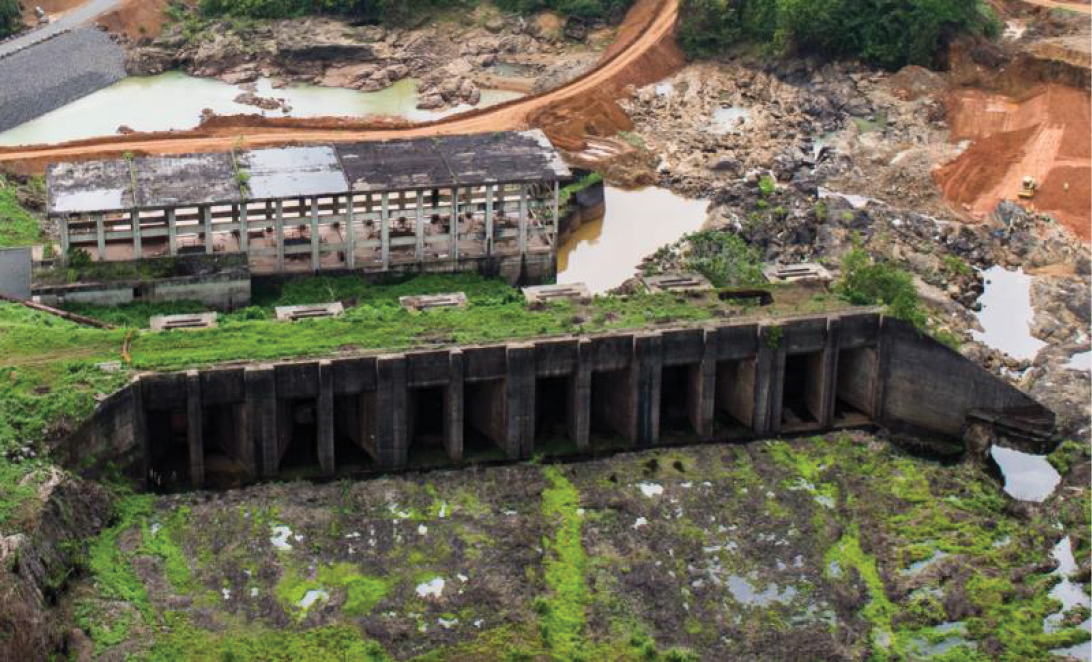
Mount Coffee Hydropower Plant before (above) and after (below) rehabilitation
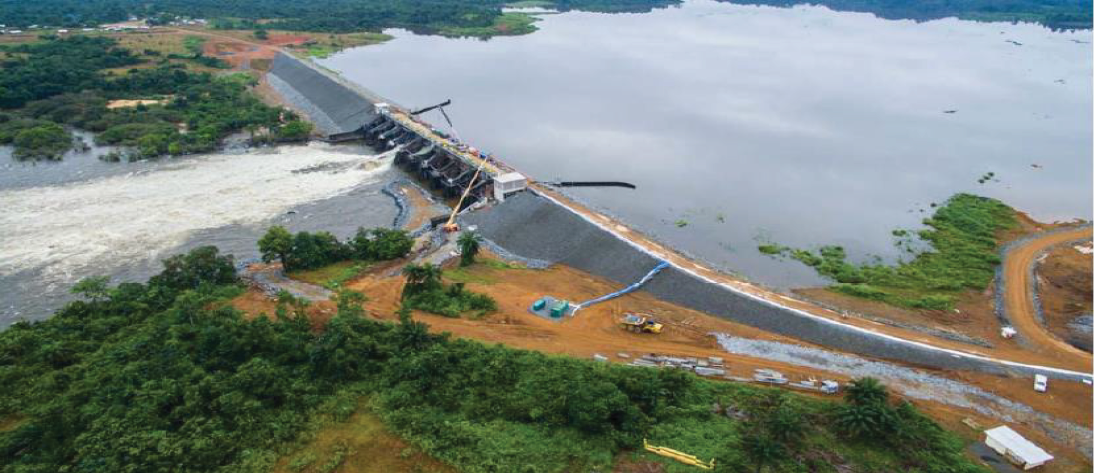
MCC worked with other donors to successfully rehabilitate Mt. Coffee into a fully operational hydropower plant that generates high quality, low-cost electricity. However, the Liberia Electricity Corporation must plan as systematically for the operational period as for the rehabilitation works. Currently, there are insufficient resources for ongoing operations and maintenance of Mt. Coffee. The utility’s inability to pay the operations, maintenance, and training contractor puts Mount Coffee’s sustainability at risk because hydropower plants require skilled staff to implement ongoing maintenance and repairs.
Utility, Regulatory, and Grid-Level Outcomes
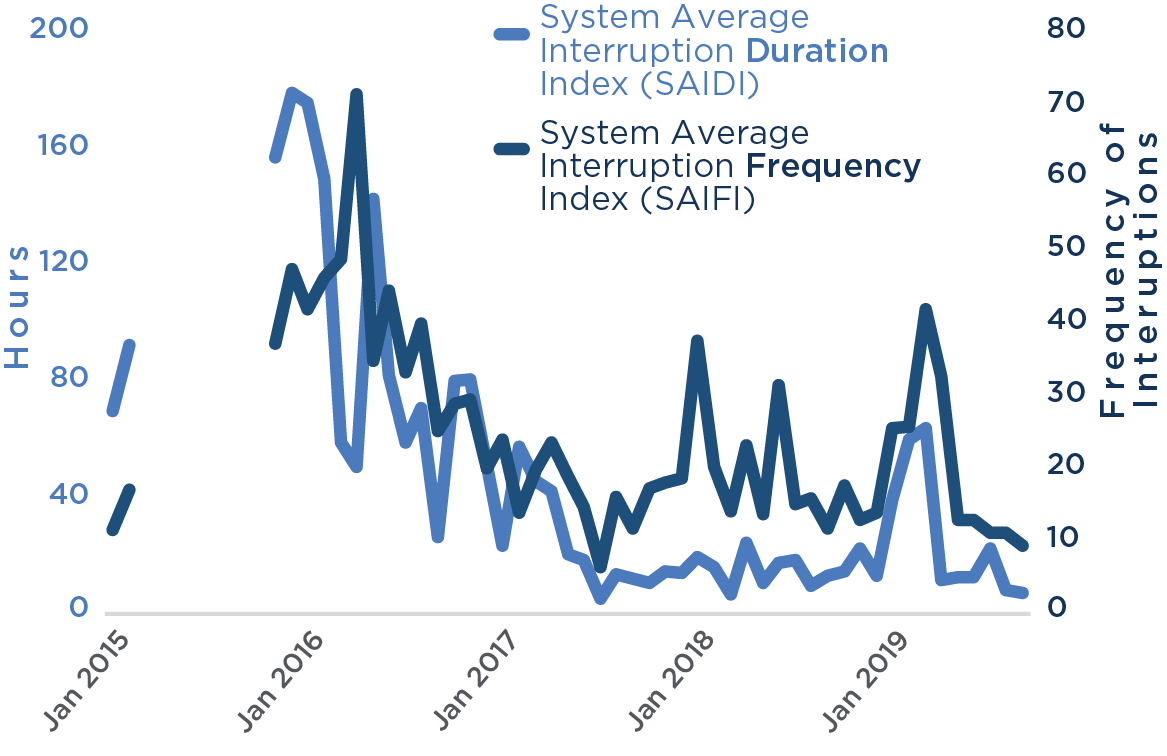
System average interruption frequency and duration index (SAIDI and SAIFI)
When the management services contractor assumed operations, the Liberia Electricity Corporation was in a destitute financial situation with excessive debt, assets in disrepair, and a shortage of equipment and tools. The poor-quality transmission and distribution network lacked capacity for new connections. The contractor has made significant progress in diagnosing problems, repairing the network, and improving information management. Operationally, since 2015, total electricity supply has increased almost fourfold from 4.2 million megawatt hours (MWh) to 18.5 million MWh in 2019. Still the utility’s underperformance persists as total electricity sold has only doubled and commercial losses have increased dramatically. Also, the contractor’s management of $195.8 million dollars in donor contracts is weak. Inadequate communication has resulted in donor projects that are misaligned with the Liberia Electricity Corporation’s needs, exceed the grid’s capacity, and exacerbate power theft.
The Liberia Electricity Corporation’s electricity quality and reliability have unquestionably improved over the past few years due to MCC’s investment. However, Liberia’s fragmented network remains fraught with mechanical and commercial challenges, while system demand has grown by 50 percent year-on-year since 2016 and continues to grow. Grid performance would further improve if the utility could fund improvements such as backing up the network, replacing overloaded transformers, and building staff capacity.
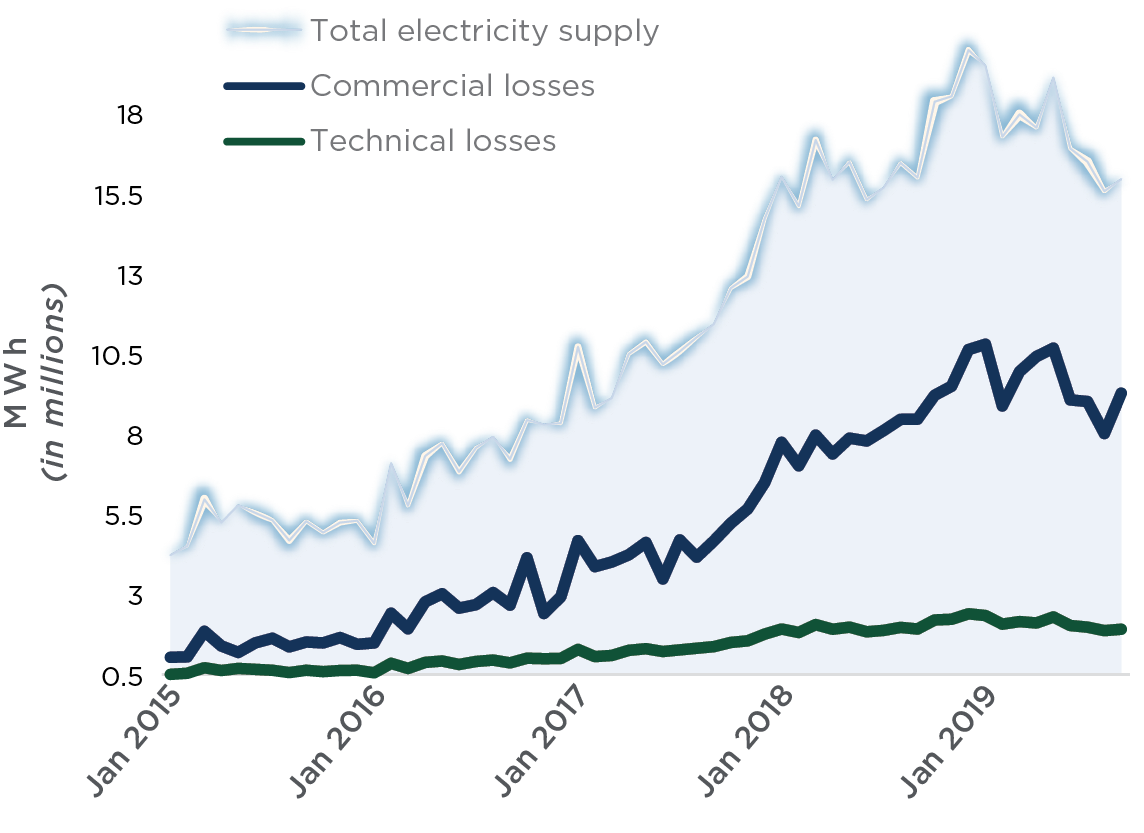
Total Electricity Supply and losses in MWh
After a slow start, in 2019, the Liberia Electricity Regulatory Commission has made important progress in establishing the commission and drafting licensing regulations for the electricity industry. The managing director and commissioners agree they must have a productive 2020 to demonstrate their value to the public and secure donor resources to ensure that the commission remains an independent agency.
Electricity Access
The Liberia Electricity Corporation offers cheaper and better-quality power than generators or mini-grids can provide. In focus group discussions with households and interviews with small business owners, respondents described how, once connected to Liberia Electricity Corporation, they could starting income-generating activities, such as selling cold drinks, or expand business operations, by staying open later and offering more goods. Customers reported that their main use of electricity was lighting but also showed shifts toward using electronics and appliances. Small businesses shifted toward using freezers and large end-users shifted toward technology and machinery after connection.
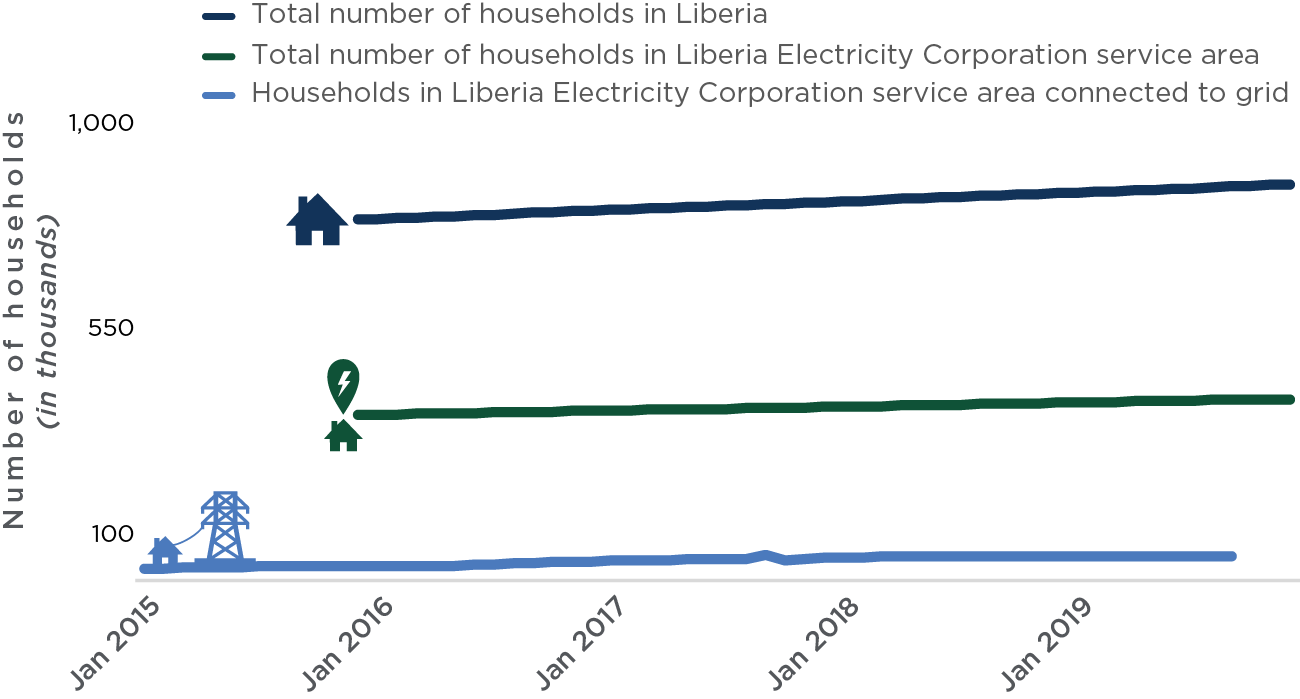
Trend data in the annual number of customers
The utility has been unable to meet customer demand for connections despite increased electricity supply. After Mount Coffee was rehabilitated and other donor projects were underway, the Liberia Electricity Corporation was expected to connect 2,000–4,000 new customers per month. However, network failures, delays in donor projects, and the utility’s low performance have limited new connections. Many residential customers are willing to pay, but given delays, have resorted to informal connections, while theft among large customers has soared. Energy theft among residential and small businesses has been partially due to donor projects that connected some but not all potential customers in a community.
MCC Learning
A political economy analysis (PEA) conducted in compact development may have helped MCC to understand the incentive structure of the utility and the government.
Even within MCC’s stringent five-year time clock, donor coordination for big public works is possible with careful planning.
Evaluation Methods
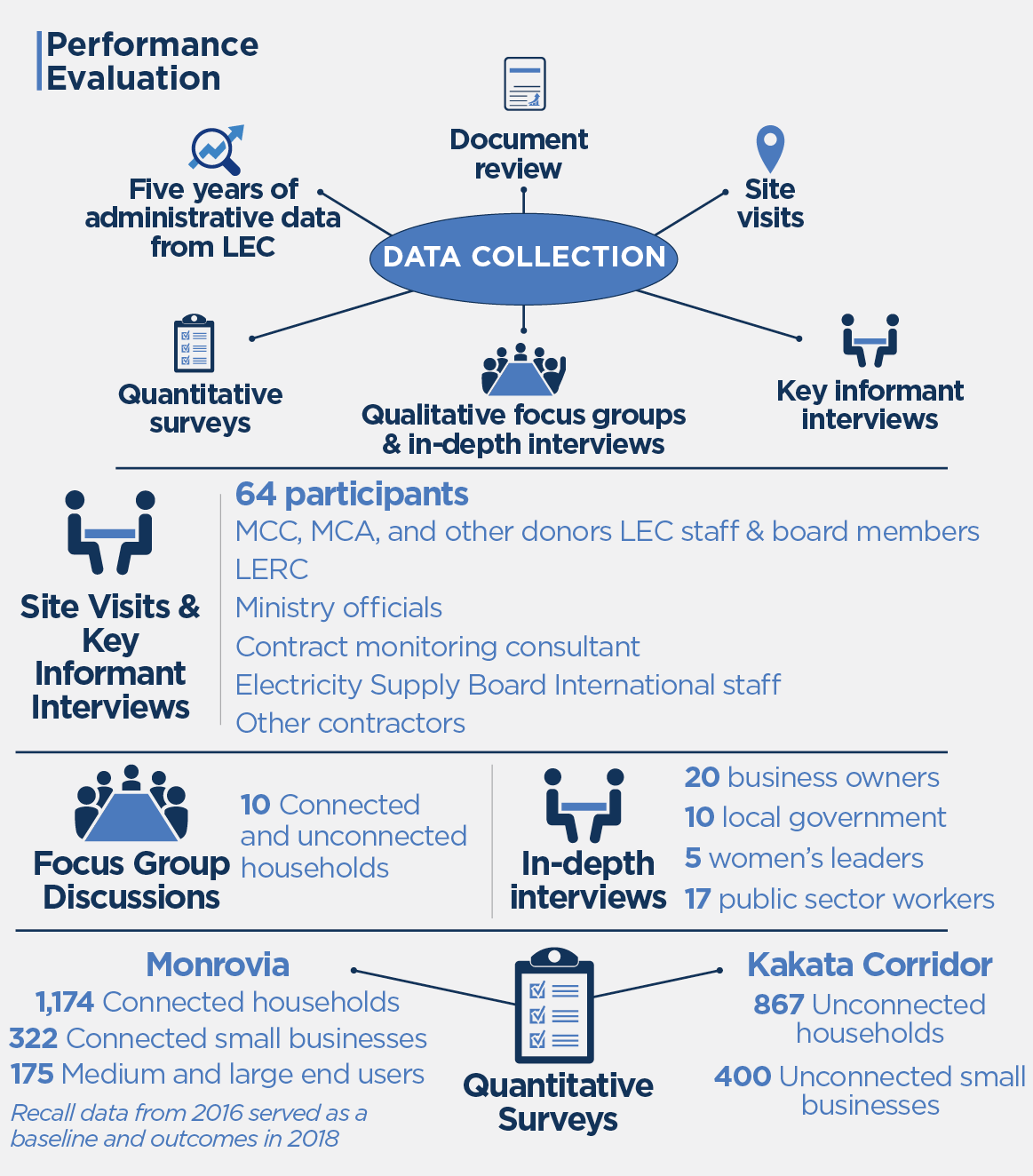
The overall performance evaluation consists of a pre-post evaluation methodology using mixed methods approaches. The interim report presents a retrospective thematic analysis of data pertinent to the project’s implementation and early outcomes. Depending on the outcomes, the exposure period ranges from 12 to 120 months. Estimates outcomes in months include: energy sector (96-120), utility (36-60), grid (36-60), and end-user outcomes (12-36).
Next Steps
The next phase of the study will begin in 2020 with results expected post-compact in 2021, followed by the endline study beginning in 2023 with the final report expected three years post-compact in 2025.
2020-002-2439


